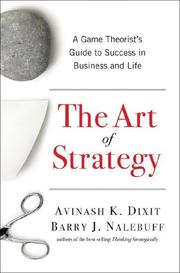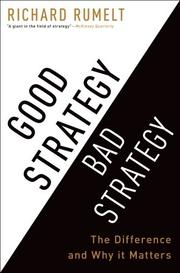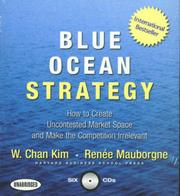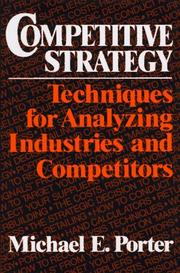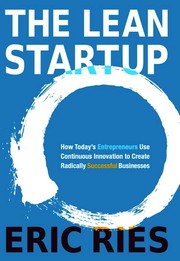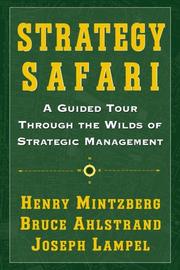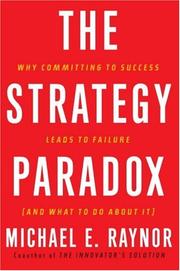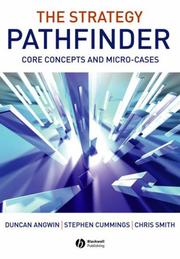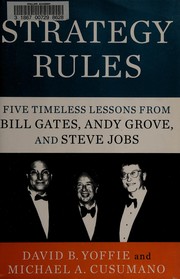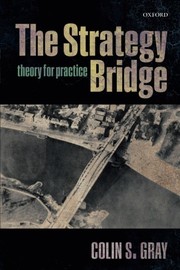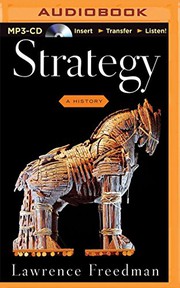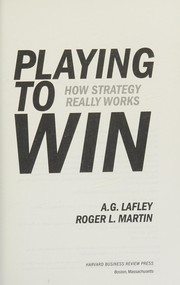Are you looking to sharpen your strategic thinking and decision-making skills? Look no further than this curated list of the 20 best books about strategy. Whether you’re a business leader, a military strategist, or simply someone looking to improve your problem-solving abilities, these books offer valuable insights and practical advice on how to navigate complex challenges and achieve your goals. From classic works by Sun Tzu and Clausewitz to modern bestsellers by Michael Porter and Clayton Christensen, there’s something for everyone on this list. Get ready to level up your strategic game with these must-read strategy books.
Contents
- 1 20 Best Strategy Books
- 2 The Art of Strategy
- 3 Good Strategy/Bad Strategy
- 4 The Strategy Book
- 5 Blue Ocean Strategy
- 6 The Innovator’s Dilemma
- 7 Competitive Strategy
- 8 The Lean Startup
- 9 Strategy Safari
- 10 The Strategy Paradox
- 11 The Strategy of Conflict
- 12 The Strategy Pathfinder
- 13 Strategy Rules
- 14 The Strategy Bridge
- 15 Strategy: A History
- 16 The Strategy of Desire
- 17 The Art of War
- 18 Competitive Strategy: Techniques for Analyzing Industries and Competitors
- 19 Blue Ocean Strategy: How to Create Uncontested Market Space and Make the Competition Irrelevant
- 20 Playing to Win: How Strategy Really Works
- 21 The Innovator’s Dilemma: When New Technologies Cause Great Firms to Fail
- 22 Final Thoughts on Best Strategy Books
- 23
20 Best Strategy Books
The Art of Strategy
by Avinash K. Dixit and Barry J. Nalebuff
The Art of Strategy by Avinash K. Dixit and Barry J. Nalebuff is a captivating book about the intricacies of decision-making and the art of outmaneuvering opponents. This insightful strategy book provides a comprehensive overview of game theory and its applications to everyday life, business, and beyond.
Dixit and Nalebuff delve into the strategic thinking behind various scenarios, from business negotiations to political campaigns, offering practical advice and real-world examples to illustrate their points. Through engaging storytelling and compelling case studies, the authors unravel the complexities of decision-making and illustrate how strategic thinking can be applied to achieve favorable outcomes.
Whether you’re a business professional, a student of economics, or simply someone intrigued by the intricacies of decision-making, The Art of Strategy offers valuable insights and a fresh perspective on the art of decision-making. This book on strategy is a must-read for anyone interested in gaining a deeper understanding of the strategic mind.
Good Strategy/Bad Strategy
by Richard Rumelt
Good Strategy/Bad Strategy by Richard Rumelt is a thought-provoking book on strategy that delves into the difference between effective and ineffective strategies. Rumelt argues that many so-called strategies are actually just a collection of goals and wishful thinking, lacking a coherent and practical plan for achieving success. He emphasizes the importance of identifying and tackling the critical challenges that stand in the way of a desired outcome, rather than simply setting lofty aspirations.
Rumelt provides real-world examples and case studies to illustrate his points, making the book about strategy both informative and engaging. He also offers practical advice for developing good strategy, including the need for a clear diagnosis of the problem at hand, an overall guiding policy, and a set of coherent actions to carry out the chosen policy.
Overall, Good Strategy/Bad Strategy is a must-read for anyone interested in understanding the principles of effective strategy and how to apply them to their own personal or professional pursuits.
The Strategy Book
by Max Mckeown
The Strategy Book by Max Mckeown is a comprehensive guide to understanding and implementing effective strategies in a rapidly changing business environment. This insightful book provides practical advice and tools for leaders and managers to develop and execute successful strategies that will drive their organizations forward. With a focus on adaptability and innovation, Mckeown offers valuable insights into how to navigate complex challenges and capitalize on emerging opportunities. Whether you are a seasoned executive or a budding entrepreneur, this strategy book is an invaluable resource for anyone looking to gain a deeper understanding of strategic thinking and planning. Mckeown’s engaging writing style and real-world examples make this book about strategy an enjoyable and informative read, packed with actionable takeaways. If you are looking to sharpen your strategic acumen and achieve sustainable success in your business endeavors, The Strategy Book is a must-read.
Blue Ocean Strategy
by W. Chan Kim and Renée Mauborgne
Blue Ocean Strategy by W. Chan Kim and Renée Mauborgne is a groundbreaking book on strategy that challenges the traditional competitive mindset. Instead of fighting for market share in a crowded ‘red ocean’ of competition, the authors advocate for creating uncontested market space in a ‘blue ocean’ of opportunity.
The book presents a framework for businesses to break free from the constraints of competition and create new demand by offering unique value to customers. Through real-world examples and case studies, Kim and Mauborgne illustrate how companies can innovate and differentiate themselves to unlock new growth and profit potential.
Blue Ocean Strategy is a compelling read for anyone looking to shift their business from competing to creating, and for those seeking a fresh approach to strategic thinking. It is a must-read for entrepreneurs, executives, and anyone interested in business innovation and growth.
The Innovator’s Dilemma
by Clayton M. Christensen
The Innovator’s Dilemma by Clayton M. Christensen is a groundbreaking book on strategy that delves into the challenges faced by established companies when disruptive innovations emerge. Christensen argues that successful companies often fail to adopt disruptive technologies because they are too focused on satisfying existing customers and improving their current products. As a result, they overlook the potential of disruptive innovations that could ultimately overtake their market.
Through extensive research and case studies, Christensen presents a compelling framework for understanding the dynamics of disruptive innovation and offers valuable insights on how companies can navigate this dilemma. He emphasizes the importance of creating separate business units to focus on disruptive technologies and encourages companies to be proactive in embracing change rather than being blindsided by it.
This strategy book has had a profound impact on the business world, challenging conventional thinking and providing invaluable guidance for companies seeking to stay competitive in an ever-evolving marketplace.
Competitive Strategy
by Michael E. Porter
Competitive Strategy by Michael E. Porter is a renowned book on strategy that has become a classic in the field of business and management. In this influential work, Porter presents a comprehensive framework for analyzing and formulating competitive strategies to gain a sustainable advantage in the marketplace. He delves into the five competitive forces that shape industry competition, providing valuable insights into how businesses can position themselves strategically to outperform their rivals.
Porter’s book about strategy also explores the concept of competitive advantage and the various ways in which companies can differentiate themselves from their competitors to achieve superior performance. With its clear, analytical approach and practical insights, this strategy book has been a go-to resource for business leaders, managers, and students seeking to understand the complexities of competition and develop effective strategies for success.
The Lean Startup
by Eric Ries
The Lean Startup by Eric Ries is a groundbreaking book on strategy that introduces a new approach to creating and managing successful startups. Ries emphasizes the importance of testing assumptions and continuously adapting to feedback in order to build a sustainable business. Drawing on his own experiences as a startup founder and advisor, he presents a methodology that helps entrepreneurs minimize wasted time and resources while maximizing the chances of success.
Ries introduces the concept of the ‘lean startup’, which focuses on rapid iteration, product development, and a scientific approach to creating and managing startups. He highlights the importance of using validated learning, experimentation, and iterative design to shorten product development cycles, measure progress, and gain valuable customer feedback. The book is filled with practical advice, real-world examples, and actionable strategies that can help entrepreneurs and business leaders navigate the uncertain terrain of innovation and create a sustainable business.
Strategy Safari
by Henry Mintzberg, Bruce Ahlstrand, and Joseph Lampel
Strategy Safari is a captivating book about strategy that takes readers on a wild journey through the jungle of strategic management theories. Written by Henry Mintzberg, Bruce Ahlstrand, and Joseph Lampel, this book offers a comprehensive overview of various schools of thought in strategic management, including the design, planning, positioning, entrepreneurial, cognitive, learning, and power schools. The authors use the metaphor of a safari to guide readers through the diverse terrain of strategic management, providing insights into the different perspectives and approaches to creating and implementing strategies. Whether you’re a student, a business professional, or simply curious about the intricacies of strategic management, this book on strategy is an essential read. With its engaging storytelling and in-depth exploration of strategic concepts, Strategy Safari is a must-read for anyone seeking a deeper understanding of the complexities of organizational strategy.
The Strategy Paradox
by Michael E. Raynor
The Strategy Paradox by Michael E. Raynor is a thought-provoking book on strategy that challenges traditional business thinking. Raynor delves into the complexities of strategic decision-making and offers a fresh perspective on how companies can navigate the unpredictable nature of the business world. The book explores the paradoxical nature of strategic choices, highlighting the inherent trade-offs and uncertainties that leaders face when making decisions. Raynor presents compelling case studies and insightful analysis to illustrate how successful companies have managed to thrive despite the inherent paradoxes of strategy. Through his research, Raynor provides valuable insights and practical advice for leaders looking to develop a more nuanced understanding of strategic planning. With its engaging writing style and compelling arguments, The Strategy Paradox is a must-read for anyone interested in gaining a deeper understanding of the intricacies of strategic management.
The Strategy of Conflict
by Thomas C. Schelling
The Strategy of Conflict by Thomas C. Schelling is a groundbreaking book on strategy that explores the dynamics of conflict and competition. Schelling, a Nobel Prize-winning economist, delves into the strategic interactions between individuals, organizations, and nations, shedding light on the rational decision-making processes that underpin conflicts and negotiations.
In this thought-provoking book about strategy, Schelling introduces the concept of ‘game theory’ to analyze strategic interactions and decision-making, offering valuable insights into the art of strategic thinking. He explores how parties in conflict can manipulate, coerce, and communicate with each other to achieve their goals, and how they can use the threat of violence to influence outcomes.
The Strategy of Conflict is a timeless and influential strategy book that continues to be relevant in fields such as economics, politics, and military strategy. Schelling’s work provides a deep understanding of the strategic choices individuals and organizations make in the face of conflict, making it essential reading for anyone interested in decision-making and negotiation.
The Strategy Pathfinder
by Duncan Angwin and Stephen Cummings
The Strategy Pathfinder by Duncan Angwin and Stephen Cummings is a comprehensive and practical book about strategy that provides a valuable resource for both students and professionals in the field of business. The authors offer a clear and accessible guide to strategic management, covering a wide range of concepts and tools to help readers navigate the complexities of strategic decision-making.
With its engaging and user-friendly approach, this strategy book is designed to help readers develop a deeper understanding of strategic thinking and its practical application in real-world business situations. The book covers topics such as analyzing the competitive environment, formulating strategy, and implementing strategic change, providing a holistic view of the strategic management process.
By combining theoretical insights with practical examples and case studies, The Strategy Pathfinder equips readers with the knowledge and skills needed to tackle the challenges of strategic management with confidence. Whether you are a student looking to deepen your understanding of strategic management or a professional seeking practical insights, this book on strategy is an indispensable resource for anyone interested in mastering the art of strategic thinking.
Strategy Rules
by David B. Yoffie and Michael A. Cusumano
Strategy Rules by David B. Yoffie and Michael A. Cusumano is a compelling book on strategy that offers valuable insights into the key principles that drive business success. The authors, both renowned experts in the field of business strategy, distill their extensive research and analysis into a set of strategic rules that have been proven to be effective in a variety of industries and contexts.
This strategy book provides a comprehensive framework for understanding and implementing successful strategies, drawing on real-world examples and case studies to illustrate how these principles can be applied in practice. The authors emphasize the importance of agility, innovation, and adaptability in today’s fast-paced and constantly evolving business environment, offering practical guidance for leaders looking to navigate complex strategic challenges.
Whether you’re a seasoned executive or a budding entrepreneur, Strategy Rules offers a wealth of actionable insights that can help you develop and execute winning strategies for your organization. This book about strategy is a must-read for anyone looking to gain a competitive edge in the ever-changing world of business.
The Strategy Bridge
by Colin S. Gray
The Strategy Bridge by Colin S. Gray is a comprehensive and insightful book on strategy that delves into the complexities of warfare and international relations. Gray provides a compelling exploration of the various elements that contribute to successful strategic thinking and decision-making. Through a combination of historical analysis and contemporary case studies, the book offers valuable insights into the art of strategy and the challenges that leaders face in navigating the complexities of conflict and competition.
Gray’s writing is engaging and thought-provoking, making The Strategy Bridge a must-read for anyone interested in understanding the dynamics of strategic planning and execution. Whether you’re a military leader, a business executive, or a student of international relations, this book about strategy provides a wealth of knowledge and practical guidance for approaching strategic challenges with intelligence and agility. With its emphasis on the importance of adaptability and critical thinking, The Strategy Bridge is a timeless resource for anyone seeking to master the art of strategy.
Strategy: A History
by Lawrence Freedman
Strategy: A History is a comprehensive exploration of the concept of strategy throughout human history. In this thought-provoking book, Lawrence Freedman delves into the evolution of strategic thinking from ancient times to the present day, examining how it has shaped the course of events and influenced the decisions of leaders and nations.
By analyzing a wide range of historical and contemporary examples, Freedman offers valuable insights into the art and science of strategy, illuminating the complex and often unpredictable nature of human conflict and competition. From military campaigns to business competition, from political maneuvering to game theory, Strategy: A History provides a fascinating and insightful look at the myriad ways in which strategy has been employed and adapted over the centuries.
Whether you’re a student of history, a business leader, or simply interested in the dynamics of human interaction, this book about strategy is a must-read. With its engaging narrative and rich historical detail, Strategy: A History is a thought-provoking exploration of one of the most enduring and influential concepts in human society.
The Strategy of Desire
by Ernest Dichter
The Strategy of Desire by Ernest Dichter is a pioneering book about the psychology of consumer behavior and advertising. Dichter, known as the “father of motivational research,” delves into the subconscious desires and motivations that drive consumer choices. In this influential strategy book, Dichter explores the power of emotions, instincts, and unconscious desires in shaping consumer behavior, and how businesses can leverage this knowledge to create effective marketing strategies. He discusses the importance of understanding human psychology in advertising and marketing, and provides practical insights into how to tap into consumers’ desires to influence their buying decisions. The Strategy of Desire offers a fascinating look into the world of consumer psychology and provides valuable lessons for businesses looking to develop successful marketing campaigns. It’s a must-read for anyone interested in understanding the complex interplay of human desires and consumer behavior.
The Art of War
by Sun Tzu
The Art of War by Sun Tzu is a classic book on strategy that has stood the test of time. Written over 2,000 years ago, this ancient Chinese text is still widely read and studied today, not just by military leaders, but also by business executives, athletes, and scholars. Sun Tzu’s timeless wisdom on the art of war is applicable to a wide range of situations and has been hailed as one of the most influential strategy books ever written.
The book is divided into 13 chapters, each offering valuable insights into the nature of conflict, the importance of planning, and the tactics for achieving victory. Sun Tzu’s teachings emphasize the importance of understanding one’s strengths and weaknesses, knowing the enemy, and using strategy to outmaneuver opponents. His emphasis on adaptability, deception, and the importance of intelligence gathering make this book about strategy a timeless guide for anyone seeking to achieve success in the face of adversity.
Competitive Strategy: Techniques for Analyzing Industries and Competitors
by Michael E. Porter
Competitive Strategy: Techniques for Analyzing Industries and Competitors by Michael E. Porter is a renowned strategy book that provides a comprehensive framework for analyzing industries and competitors. In this influential work, Porter presents a systematic approach to understanding the competitive forces that shape an industry and the strategies that can be employed to gain a sustainable competitive advantage.
The book delves into the Five Forces framework, which examines the bargaining power of buyers and suppliers, the threat of new entrants, the threat of substitutes, and the intensity of rivalry among existing competitors. Porter also explores the concept of competitive advantage and the different strategies that companies can pursue to achieve it, such as cost leadership and differentiation.
Through detailed case studies and practical examples, Porter demonstrates how businesses can use his analytical techniques to make informed decisions and outperform their rivals. Competitive Strategy is an essential read for anyone seeking to gain a deeper understanding of the dynamics of competition and develop effective strategic plans.
Blue Ocean Strategy: How to Create Uncontested Market Space and Make the Competition Irrelevant
by W. Chan Kim, Renée Mauborgne
Blue Ocean Strategy is a groundbreaking book on strategy that challenges the traditional approach of competing in existing market space. W. Chan Kim and Renée Mauborgne present a compelling argument for creating new, uncontested market space, where competition becomes irrelevant. They introduce the concept of “blue oceans,” which represent untapped market opportunities, and contrast them with “red oceans,” where competition is fierce.
The authors provide a systematic framework for businesses to shift from competing in overcrowded markets to creating new demand and growth in untapped markets. They offer practical tools and real-world examples to guide readers in rethinking their approach to strategy and innovation. Blue Ocean Strategy is a must-read for entrepreneurs, business leaders, and anyone seeking a fresh perspective on how to stand out in the marketplace.
This strategy book is a game-changer, offering a compelling argument for businesses to focus on creating new market space and making the competition irrelevant, rather than battling it out in crowded and competitive markets. With its clear framework and practical insights, Blue Ocean Strategy is a valuable resource for anyone seeking to drive innovation and growth in their business.
Playing to Win: How Strategy Really Works
by A.G. Lafley, Roger L. Martin
Playing to Win: How Strategy Really Works is a compelling strategy book that provides a clear and practical framework for developing and implementing winning strategies. Written by A.G. Lafley and Roger L. Martin, this book offers valuable insights into the world of business strategy, drawing from their extensive experience at Procter & Gamble and the Rotman School of Management, respectively.
The authors emphasize the importance of making strategic choices that create a competitive advantage and drive long-term success. They argue that effective strategy is about making clear, integrated choices that position a company to win. The book outlines five essential questions that leaders must ask themselves to develop a winning strategy, providing real-world examples to illustrate these principles in action. Lafley and Martin’s approach is both practical and insightful, making this book a must-read for anyone looking to gain a deeper understanding of strategic thinking and decision-making. Whether you are a business leader, entrepreneur, or student of business, this book about strategy is sure to provide valuable guidance and inspiration for developing winning strategies.
The Innovator’s Dilemma: When New Technologies Cause Great Firms to Fail
by Clayton M. Christensen
The Innovator’s Dilemma, written by Clayton M. Christensen, is a groundbreaking book on strategy that delves into the challenges that successful companies face when disruptive technologies emerge. Christensen argues that established companies often fail to adapt to these new technologies because they are too focused on serving their existing customer base and improving their current products. This book about strategy outlines the concept of disruptive innovation and provides examples of how well-known companies such as Kodak, Blockbuster, and Nokia fell victim to this dilemma.
Christensen’s research and analysis in this strategy book provide valuable insights for business leaders, entrepreneurs, and innovators on how to navigate the turbulent waters of technological change. The book offers a compelling framework for understanding how innovation can both drive success and lead to failure, and it provides actionable strategies for companies to stay ahead of the curve. The Innovator’s Dilemma is a must-read for anyone interested in understanding the dynamics of innovation and disruption in the business world.
Final Thoughts on Best Strategy Books
Exploring the top 20 books about Strategy is an enlightening journey that offers valuable insights into the art of decision-making and planning. Whether you’re a business leader, entrepreneur, or simply someone looking to enhance your strategic thinking, these books provide a wealth of knowledge and inspiration to help you navigate the complexities of strategy. From timeless classics to modern bestsellers, the diverse range of perspectives and approaches covered in these books make them essential additions to any strategist’s library.
Which book about Strategy is best?
The best book on Strategy can vary with personal preference, but three widely recommended titles are:
- The Art of Strategy by Avinash K. Dixit and Barry J. Nalebuff,
- Good Strategy/Bad Strategy by Richard Rumelt,
- The Strategy Book by Max Mckeown.
Each offers valuable insights and could be a great starting point.
What are the best books to learn about Strategy?
For those looking to learn about Strategy, there is a wealth of literature that can provide a comprehensive understanding of the subject. Some of the most highly recommended books include:
- The Art of Strategy by Avinash K. Dixit and Barry J. Nalebuff,
- Good Strategy/Bad Strategy by Richard Rumelt,
- The Strategy Book by Max Mckeown,
- Blue Ocean Strategy by W. Chan Kim and Renée Mauborgne,
- The Innovator’s Dilemma by Clayton M. Christensen,
- Competitive Strategy by Michael E. Porter,
- The Lean Startup by Eric Ries,
- Strategy Safari by Henry Mintzberg, Bruce Ahlstrand, and Joseph Lampel,
- The Strategy Paradox by Michael E. Raynor,
- The Strategy of Conflict by Thomas C. Schelling
These books offer a range of perspectives on Strategy, covering various aspects and approaches to the subject.
What are the best books about Strategy?
The best books about Strategy are:
- The Art of Strategy by Avinash K. Dixit and Barry J. Nalebuff,
- Good Strategy/Bad Strategy by Richard Rumelt,
- The Strategy Pathfinder by Duncan Angwin and Stephen Cummings,
- Strategy Rules by David B. Yoffie and Michael A. Cusumano,
- Strategy Safari by Henry Mintzberg, Bruce Ahlstrand, and Joseph Lampel,
- Competitive Strategy by Michael E. Porter.
Each offers unique insights into the subject. While these books about Strategy are highly regarded, it’s important to note that any list of ‘best’ books is subjective and reflects a range of opinions.
What are the best Strategy books of all time?
Choosing the best Strategy books of all time can vary depending on who you ask, but five titles that are often celebrated include
- The Art of Strategy by Avinash K. Dixit and Barry J. Nalebuff,
- Good Strategy/Bad Strategy by Richard Rumelt,
- The Innovator’s Dilemma by Clayton M. Christensen,
- Strategy Safari by Henry Mintzberg, Bruce Ahlstrand, and Joseph Lampel,
- and The Strategy Pathfinder by Duncan Angwin and Stephen Cummings.
Each of these books has made a significant impact in the field of Strategy and continues to be influential today.

